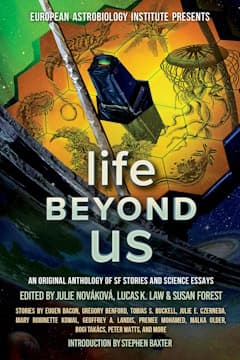
Life Beyond Us edited by Julie Nováková, Lucas K. Law and Susan Forest
(Laksa Media Groups, 2023)
Reviewed by Niall Harrison
Let's start with the verdict: Life Beyond Us is not a very good anthology.
I say this up-front because in concept and in some of the execution it is an attractive proposition. For one thing it is, thanks to a successful kickstarter campaign, a very big anthology—580 pages and, by my estimate, a decent chunk north of 200,000 words. For another, it is animated by a strong and evergreen theme—what it would mean to encounter non-human intelligence. It is also one of those occasional anthologies that pair science fiction stories with essays written by working scientists, in this case coordinated by the European Astrobiology Institute. These factors combined mean that there are certainly some notable and good things about Life Beyond Us and in it; but not enough, in my view, to justify the time spent with it.
The editorial team deserve praise, for instance, for casting a wide net. Across the foreword, introduction, 27 stories, 27 essays, and two afterwords, there are at least 19 countries represented; a majority are European, but another four continents also have presence. (I say ‘at least’ because not all contributors specify a country, and some identify as hyphenate or migrant identities.) Most of the fiction writers were invited, but two came from an open reading period. A further two are translations. Thirteen authors identity as men, 13 as women, and 1 as non-binary; I recognised 14 of them from earlier work. Non-fiction is slightly less equitable, with 19 men. I would hazard that approximately a third of contributors identify as something other than white. Overall, it is a table of contents that promises variety and novelty.
But drawing on a broad network is only one part of the editorial arts, and in other areas the construction of Life Beyond Us feels weak. The stories are, for instance, all very similar in length, with only a couple falling outside a tight 4,000–8,000 word range. Their topics vary, but their rhythms become familiar; a couple of meaty longer stories would have helped to manage the anthology’s pacing. The sequencing also seemed a little haphazard to me. Every so often an obvious thematic pair appear back-to-back, but in most cases the progression from one story to the next seems arbitrary. Organising the stories into subsections—even ones as broad as, say, the Earth, the solar system, and beyond—would I think have helped the book to feel more purposeful.
That said, I also think even with such an approach, most readers would still find there are not enough stories that speak to them. For me, there is a deadening volume of work reminiscent of Analog in its early-century doldrums: formulaic plots built around solvable problems, told with a total lack of stylistic flair or imaginative novelty. I’d put roughly a third of the stories in this box, exemplified by G. David Nordley’s “Titan of Chaos”: Hartigan O’Reilly (apparently a character Nordley has used before) is “the only full-time law enforcement officer of the Cislunar Republic’s Saturn System constabulary”, and is called to rescue a ship that has been swallowed by an ice worm on Titan. There is, it turns out, a conspiracy to make money by controlling the worms; it is foiled. There is absolutely no insight into what this type of alien contact might mean, and Fabian Klenner’s accompanying essay therefore has to focus on the potential for life on Titan in general, rather than any issues raised directly by the story. Too many pairings play out the same way.
There are a few convincing synergies. Eugen Bacon’s “Human Beans”, for instance, describes the travails of an improbably beautiful woman who notices that people are starting to vanish; at story’s end, she is herself swooped away to a “super earth” where a better, more integrated and compassionate society is being founded. The narrative is not quite as compelling as the concept, but Tony Milligan’s exegesis reflects insightfully on how it explores notions of biological belonging, harmony, preservation, and rewilding, and deepened my appreciation of Bacon’s work.
And there are four stories that would stand out even in stronger company. Peter Watts’ “Defective” is dense conceptually (in the nature of its alien, and its protagonist, a xenolinguist who reprogrammes himself to be less human), thematically (the consequences of shifting our metaphors for aliens from gods to immigrants), linguistically (scientific terminology just the right side of rebarbatively intense), and narratively (an asteroid ship dealing with defects in spacetime). It is very good, and bleakly funny. “Lumenfabulator” by Liu Yang is the anthology’s shortest piece, and some infelicities crept through Ladon Gao’s translation, but it has a lovely concept at its core, describing the life cycle of crystal beings who absorb poems to grow, executed with just enough detail to evoke their reality. Jana Bianchi’s “Deep Blue Neon” is the movingly optimistic tale of a Brazilian researcher who discovers a novel species of whale and (in a resonance with Watts) infects herself with their symbiotic bacteria to facilitate communication. It is creatively told through excerpts from a museum exhibition commemorating the contact, a quarter of a century later. And Deji Bryce Olukotun’s “This is How We Save Them” eloquently skewers the foibles of big game hunters on a terraformed moon; it is filled with effective details and crisp dialogue, raising questions of our responsibility to existing ecosystems and the potential for a form of first contact with them.
Anthologies are tools for exploration, which means I don’t require or expect every story to hit to consider them worthwhile. And Life Beyond Us also contains stories I liked by Tobias Buckell, Tessa Fisher, Simone Heller, Arula Ratnakar, and Bogi Takács; but in the final count I put barely more than a third of the stories in the plus column. It is, as I say, not enough.
Review from BSFA Review 21 - Download your copy here.
